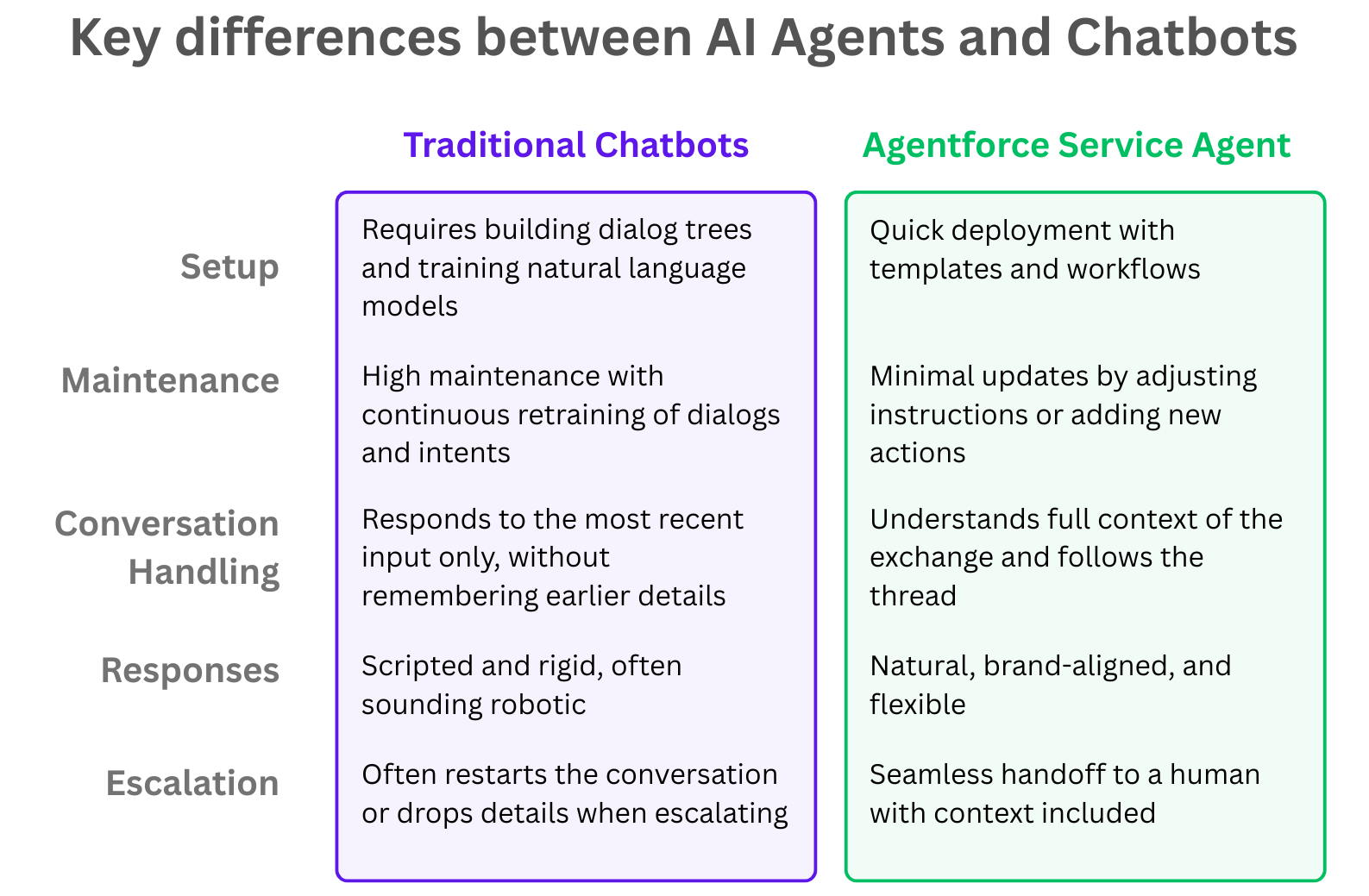By
Customer service is the key to sustained business growth. The challenge is that customers often expect fast, personalized support at any time of the day to resolve their concerns. How can businesses keep up with these rising demands? In the past, many companies would hire entire workforces in several countries to ensure a 24/7 customer service strategy. Now with the rise of AI, these demands can be met with a simple Agentforce service agent.
At its core, an Agentforce service agent is an AI-powered assistant designed to resolve customer issues across digital channels. Unlike traditional chatbots that rely on pre-written scripts, these agents use generative AI to understand context, answer questions naturally, and escalate conversations to human agents when needed.
So, no, this is not a chatbot automation configuration. It’s a tool that can deliver reliable service at scale while freeing up human agents to focus on complex cases and relationship-building. In this article, we’ll explore how an Agentforce service agent works, what makes it unique, and why it’s becoming an essential tool for modern service teams.
Why Agentforce Matters in Customer Service
Businesses stand out when they provide fast and accurate support (even if it’s at 2AM). It’s a competitive market reality. An Agentforce service agent can help organizations meet those expectations. Below are some of the trends and challenges driving the need for something better.
- 88% of customers claim good service makes them more likely to purchase from the same company again, making it clear that customer experience is key to driving revenue.
- Service agents report their workload has increased, while cases are more complex than a year ago.
- Only 14% of customer service issues are fully resolved via self‐service. Even for “very simple” issues, only 36% are resolved without needing assisted channel help.
Related Article: 5 Digital Customer Engagement Strategies
How an Agentforce Service Agent Fits In
An Agentforce service agent is able to tackle many of these challenges. It combines the strengths of modern AI, trusted data sources, and constant availability. And again, it’s not a typical automated chatbot that requires a lot of pre-selected options in order to function properly. To emphasize this, here are ways the agent can make an impact:
- Handles a high volume of routine questions without making human agents repeat themselves
- Provides consistent responses grounded in the company’s own knowledge base and CRM systems so that answers stay accurate
- Works across multiple channels (web, messaging, self-service portals) to meet customers where they are, day or night
- Escalates or hands off to a human when complexity, empathy, or a personal touch is required
Companies that adopt AI and automation report greater efficiency and workload balance for their teams. When simple or repetitive work gets taken care of by AI, humans can focus on more strategic tasks. Remember that improving resolution on first contact is increasingly important. With low rates of self-service success, companies that can reduce repeat contacts will save both time and cost.
Trust and customer satisfaction depend heavily on accuracy, response times, and how human the interaction feels. A well-implemented Agentforce service agent that uses generative AI and trusted data can raise trust. The technology is often so seamless, that users don’t know the difference between the AI agent and a live service rep.
Core Capabilities of an Agentforce Service Agent
An Agentforce service agent is designed to go well beyond answering basic questions. It uses generative AI and Salesforce’s trusted data foundation to deliver service that feels natural, responsive, and reliable. Below are the core capabilities that make it valuable for modern service teams.
Natural conversation
The agent understands context and intent, which allows it to respond in ways that feel more like speaking with a person than a scripted chatbot. This helps reduce customer frustration and creates smoother interactions.
24/7 availability
Customers expect support around the clock. An Agentforce service agent operates across digital channels at all hours, which means issues get resolved whenever they arise instead of waiting for office hours.
Grounded in trusted data
The agent draws from knowledge articles, past case records, and CRM data to ensure accuracy. Because it is tied directly to Salesforce’s trust framework, responses are consistent with company policies and up-to-date information.
Contextual understanding
Unlike traditional bots, the agent remembers the flow of a conversation. It can handle clarifying questions, exceptions, and multi-step issues without forcing the customer to start over.
Seamless handoff to humans
Not every problem can or should be solved by AI. An Agentforce service agent knows when to escalate a case, transferring it smoothly to a human agent with all the context captured so the customer doesn’t need to repeat themselves.
Quick deployment
Service leaders can set up an agent using templates and workflows instead of building decision trees or training models from scratch. This reduces the time it takes to get value from the system.
Related Article: Customer Experience Optimization: 5 Key Considerations
Together, these capabilities help organizations reduce case backlog, cut costs, and create more satisfying service experiences. This is an incredible and revolutionary technology that is going to shape the future of customer service.
Agentforce Service Agent vs. Traditional Chatbots
Traditional chatbots were designed to handle predictable questions using scripted dialog flows. While this approach worked for straightforward requests, it often left customers frustrated when their issue fell outside of those narrow paths. An Agentforce service agent is built different. It uses generative AI and contextual awareness to adapt to conversations in real time, offering flexibility that scripted bots cannot match.

An Agentforce service agent scales with business needs more easily, since updates can be made by adjusting instructions rather than redesigning entire dialog flows. This ultimately means customers get faster resolutions because the AI can handle unexpected questions and exceptions rather than hitting dead ends. And service leaders benefit from lower upkeep costs and improved customer satisfaction scores, making these agents a clear winner.
Related Article: Customer Service Automation Playbook
4 Business Benefits of Using an Agentforce Service Agent
The big question is, how do you provide better customer experiences, all while keeping your costs under control? An Agentforce service agent helps service teams strike that balance by combining automation, intelligence, and scalability. Companies that adopt AI in their service operations are already seeing measurable improvements in efficiency and customer satisfaction.
1. Higher resolution rates
Customers are more likely to get their issues solved on the first interaction when conversations are handled by an agent that understands context and draws from trusted information. This reduces repeat contacts and builds confidence in the service experience.
2. Lower operational costs
Automating repetitive inquiries allows organizations to scale their service capacity without adding more headcount. The result is leaner operations and better use of resources.
3. Employee productivity
With an Agentforce service agent handling routine cases, employees can shift their attention to complex problem-solving and meaningful customer engagement. This improves morale while ensuring human talent is focused where it adds the most value.
4. Customer satisfaction and loyalty
When interactions feel natural and helpful, customers are more satisfied. Over time, these positive experiences build stronger loyalty and long-term trust in the brand.
Related Article: Top 15 Customer Engagement Metrics for 2025
Setting Up an Agentforce Service Agent
One of the advantages of the Agentforce service agent is how quickly it can be put into action. Unlike legacy chatbot systems that require long build cycles, this solution is designed for speed and flexibility. Service leaders can go from concept to deployment in a matter of days instead of months.
Here’s a quick overview of the setup process:
- From Salesforce Setup, search for New Agent in the Quick Find box
- Select the type of agent to create (in this case, the service agent)
- Choose from prebuilt templates tailored for common service scenarios
- Configure workflows and connect the agent to knowledge articles, CRM data, and case histories
- Test the agent in a controlled environment, then roll it out across channels
Traditional chatbots demand extensive training of language models and constant upkeep. An Agentforce service agent, by contrast, comes with prebuilt actions and the ability to improve over time through natural language instructions. That means service leaders don’t need to manage complex dialog trees or train models from scratch.
Because the agent is grounded in Salesforce’s Einstein 1 Platform, every interaction runs through the Trust Layer. This ensures sensitive data is handled securely while still allowing the agent to draw from relevant, accurate information. For organizations in regulated industries, this framework adds a layer of confidence that customer interactions remain compliant.
The Future of Service with Agentforce
The experimentation phase with AI in customer service is officially over. This new AI service model will be the foundation for how organizations deliver consistent and scalable support moving forward. In many ways, Salesforce is leading this effort, with their Agentforce service agents helping companies balance efficiency with customer experience.
With that in mind, what are some industry trends shaping the future?
Growing AI adoption: IDC projects global spending on AI systems will surpass $300 billion by 2026, with customer service identified as one of the top use cases.
Leadership sentiments: 61% of C-level executives are open to engaging with AI if it saves them time and effort.
Hybrid service models: Many of the strongest service outcomes happen when AI handles repetitive cases and humans focus on nuanced or emotional issues.
Regardless of how you feel about AI in customer service, these agents can significantly expand the reach of service teams. This advanced technology can cover routine and repetitive tasks without compounding and overloading your workforce. Contrary to popular belief, these agents actually enhance personalization by leveraging CRM data to deliver context-aware responses.
Related Article: Agentforce Use Cases: Real-World Applications for AI
These agents are not designed to replace all service workers. It’s a partnership between humans and AI, where the agent clears the backlog and humans step in for complex problem-solving. As Salesforce continues to improve and refine this technology, organizations benefit from the access to the latest advancements without large reinvestments.
An Agentforce service agent is by no means a replacement for human service, but it does position organizations to stay competitive as customer expectations continue to rise and as digital channels expand. For companies that want to future-proof their service strategies, adopting the agent now ensures they can scale smoothly into the next phase of AI-driven customer engagement.
Partner with TELUS Digital, the top Salesforce Agentforce implementation provider, to set up your Agentforce Service Agent and transform customer service into a true competitive advantage.
Related Article: Agentforce Consultants Optimize Salesforce AI Solutions









